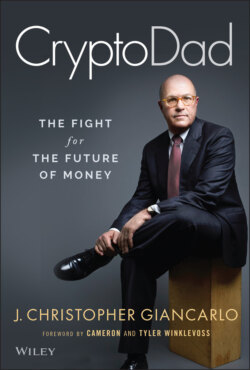Читать книгу CryptoDad - J. Christopher Giancarlo - Страница 13
The Digital Future of Money
ОглавлениеMy third observation is that the standards, protocols, and rules for the digital future of money are being established today. If we act now, we can make sure that democratic values—freedom of speech, individual economic privacy, free enterprise, and free capital markets—are encoded in the digital future of money. In so doing, we can harness this wave of innovation to maximize financial inclusion, capital and operational efficiency, and economic growth for generations to come.
If we do not act wisely and quickly, however, this new Internet wave will lay bare the shortcomings of America's aging, analog financial systems. Worse, it will mean that the values of our nondemocratic economic competitors—state surveillance, social credit systems, law subservient to the state, and centrally planned economic activity—will be embedded into the future of money, diminishing the vibrancy and health of the global economy, individual liberty, and human advancement.
This book is about the digital transformation of money and how it will change the lives of everyone in the global economy. But it is also a more personal story. It's about how I, a Margaret Thatcher–admiring, free market Republican, helped build one of the world's leading derivatives trading platforms only to find myself in the epicenter of the 2008 financial crisis. That experience led me to support the financial market reforms in the Dodd–Frank Act—a law that I now view as the last major “patch” of the long-standing analog, account-based financial system.
Those experiences led to my appointment to the CFTC by President Barack Obama. They also led to my subsequent elevation to CFTC chairman by President Donald Trump—after confirmation by a unanimous Senate.
Like Jimmy Stewart in Mr. Smith Goes to Washington,4 I went to Washington as a political naïf with reformist goals. My immediate objective was to complete and improve reforms to the swaps market. Yet, halfway through, I found myself staring at the first ripples of the next wave of the Internet—a wave that will soon shake the existing financial system to its core.
The immediate challenge was a product called Bitcoin futures, which I will discuss in more detail later. I faced significant pressure to hamper its debut. But I resisted that pressure—not without a few moments of self-doubt. Instead, I led the agency to encourage financial innovation, prepare for the Internet of Value, and oversee the development of crypto derivatives. Braving political risk, we reduced regulatory uncertainty for financial market innovators. The decision laid the groundwork for the emergence of an enormous new ecosystem of retail and institutional cryptocurrency greater than anything I could have anticipated. For that, the online cryptocurrency community dubbed me “CryptoDad.” This book is my story.
***
Undoubtedly, the continuing evolution of the Internet of Value will come in fits and starts. There will be bubbles, crashes, mistakes, and successes. There will be fiascos and criminal behavior as with any profound change. There will be enormous business disruption and even more business innovation that still cannot even be imagined.
Yet, the technology will not be stopped. Suppression in any one jurisdiction will just move the evolution to another. The direction of travel for this innovation is increasingly clear and, frankly, amazing. Bitcoin is just the tip of the iceberg. The question for American policy makers is whether they have the courage to let this new wave of innovation take place here in an intelligently regulated fashion that contributes to our economic benefit or irresolution to force it to happen elsewhere.
The question for a free people is whether they will make their voices heard in the design and operation of the digital future of money. Will the reasonable expectation of privacy from both commercial and governmental surveillance provided by paper money be found in digital money? Will a digital dollar or non-sovereign forms of digital money secure individual economic privacy against government surveillance guaranteed by the US Constitution and expected by the American people? Who will decide?
I am convinced—and I hope to persuade you in this book—that the ongoing evolution of the Internet will revolutionize money and banking in the same way it has revolutionized communications, photography, retail shopping, business meetings, and entertainment. It is naive to think that it will not. Yet, the venerable global financial services industry and its central bank overseers have been slow to even acknowledge its arrival. Some have a vested interest in the old infrastructure. The western economies will not keep pace if the matter is left to politically browbeaten bank executives, political protectors of the status quo, a few snarky financial journalists, and rigid central bankers. We need officials with courage, determination, foresight, and the willingness to take risk.
If we fall behind the curve, then the future rules, protocols, and values of digital money will be set by our nondemocratic economic competitors. Instead, a free society must show the courage of its bedrock convictions. We must fearlessly lead the digital revolution in money and finance and not cede leadership in the Internet of Value to autocratic economic competitors. That's the only way we can counter the values of authoritarianism with democratic values: individual economic privacy, rule of law, and markets free of state control.
That battle is being waged today. It will take daring and determination to regain the initiative. This book is about summoning that courage—both socially and governmentally—to overcome political inertia, institutional complacency, and societal fearfulness in the fight for the future of money.
